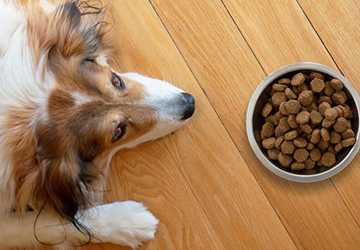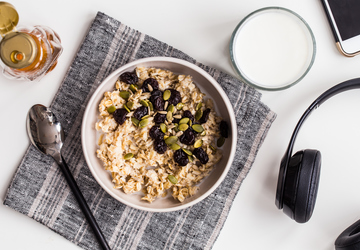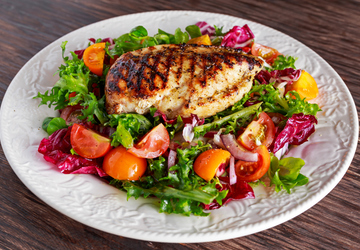Is your pet vomiting, having diarrhoea, or losing his appetite? Most dogs experience stomach upset, a severe condition requiring attention.
Giving your dog the right food only worsens the digestion problem, which is suitable for both the owner and the dog. Nevertheless, knowing what to feed a dog with a sensitive stomach will help reduce the signs of this condition and improve the dog's general health.

In this blog post, we'll explain what food is safe for dogs with sensitive stomachs, helping you make the right choice for your pet. Through these feeding strategies, you can keep your pet dog healthy, cheerful, and comfortable for the next few years.
Why Proper Nutrition is Crucial for Dogs with Sensitive Stomachs?
A balanced diet is essential in minimizing or eradicating various digestive disorders and enhancing the body's health.
When you feed your dog the proper diet, you assist its digestive system, which will not allow it to express symptoms such as vomiting, diarrhoea, or other gaseous distension. This way, you can guarantee that the vitamins and minerals your dog needs are well absorbed by its body.
However, the right food choice can improve your pet's quality of life. A healthy diet can help your companion be more active, have shiny coats, and better fight off diseases.
Therefore, this makes the pet happier, more active, and more comfortable than when the coat develops a foul smell and is matted.
In other words, it is wise to spend considerable time and money finding the right food for a dog with a sensitive stomach to improve its health and well-being in the future.
3 Foods to Feed a Dog with a Sensitive Stomach?
Building on the need to feed dogs with sensitive stomachs correctly, the next best thing is to explore the best foods for them. In this section, let's examine three particular diets that can be useful for managing digestive problems and enhancing health.
1. Limited Ingredient Diets
LIDs are considered ideal for dogs with sensitive stomachs and should be recommended. These formulas include the fewest ingredients, often one protein and one carbohydrate, thus minimizing the chances of upsetting digestion.
Benefits of LIDs include:
● It is thus easier to point out and eradicate possible causes of allergies.
● High-quality, easy-to-digest nutrients so the body can quickly and efficiently absorb the nutrients.
● Less exposure to irritation to the gastrointestinal tract
When selecting a LID, the relevant proteins should come from quality meats such as lamb, turkey, or fish, and the carbohydrates should come from products such as sweet potatoes or brown rice. Such foods as chicken, beef, and wheat should be avoided, mainly if you are allergic to them
2. Grain-Free Options
Many people feed their dogs grain-free diets due to the many benefits, especially when the dog has a sensitive stomach. These formulas substitute grains with other sources of carbohydrates like potatoes, peas, or lentils.

Advantages of grain-free diets include:
● It has also helped minimize the possibility of grain-related allergies or sensitivities.
● Protein content that is higher with a view of enhancing muscular growth as well as building up muscles.
● These are larger surface areas for absorbing nutrients in foods and products with enhanced digestibility.
If you are choosing grain-free food, make sure that the food is made from a good blend of quality proteins, fats, and fibre carbohydrates. However, any drastic changes in the diet should first be discussed with the vet because some dogs might need grains.
3. Hypoallergenic Formulas
These are developed for dogs with food intolerances or allergies. Such diets may include a different type of protein, like venison or duck, and a different type of carbohydrate, like potato or tapioca.
Benefits of hypoallergenic formulas include:
● There is a very low probability of causing an allergic reaction or sensitivity.
● The ingredients are easy to digest to assimilate the nutrients efficiently.
● Skin and coat problems such as allergic reactions are less likely to occur, which results in better skin and coat health.
In this case, select a baby formula from a well-known company that properly tests its products for the lack of possible allergens. Check with your veterinarian about the most suitable hypoallergenic formula for your dog's breed or condition.
Take Action Now for Your Dog's Health and Happiness!
Having learned the significance of the proper diet for dogs with sensitive stomachs, it is high time you took action.
Opting for one of the suggested foods, such as limited-ingredient diets, grain-free formulas, or hypoallergenic recipes, will help your pet get the nutrition they need to live a healthy life.
Don't wait! Start the process of giving your pet a better life today. Your dog will indeed thank you for it!
Frequently Asked Questions
Q. What ingredients should I avoid for a dog with a sensitive stomach?
Ans. Avoid foods you are allergic to, such as wheat, corn, and soy. Choose foods that are not processed and do not contain additives that are difficult to break down.
Q. Can I give treats to my dog with a sensitive stomach?
Ans. Yes, but be wise and save money. Pick snacks with simple ingredients; do not feed your dog treats, as this may cause stomach upsets.
Q. How long does it take to see results with a new diet?
Ans. Changes may be gradual, but if you feed the fish correctly and do not overfeed it, you should begin to see positive changes within one to two weeks.
Q. Is homemade food a good option for dogs with sensitive stomachs?
Ans. Consuming home-cooked foods is healthy if you incorporate all the food groups with fresh, readily assimilated foods. Always consult with your veterinarian or a local vet for advice on the matter.















